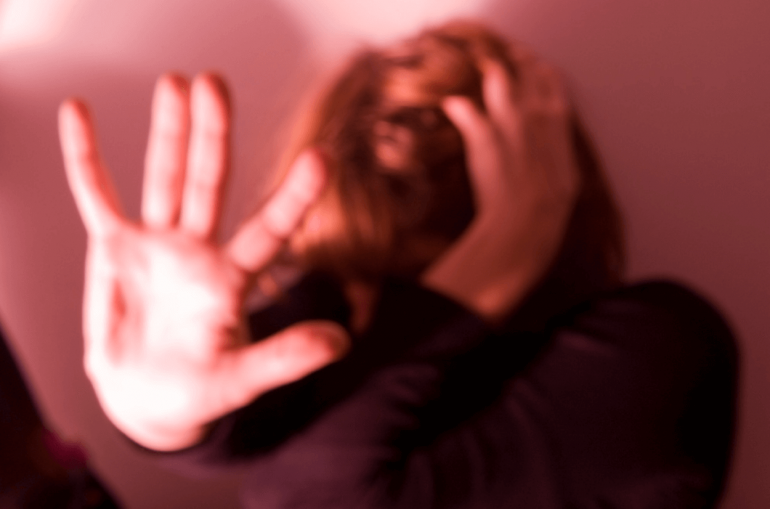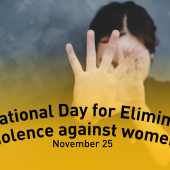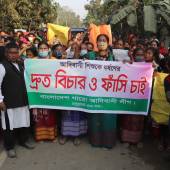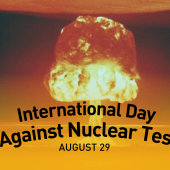UN Day for the Elimination of Violence against Women on November 25

When we hear about a woman who suffers from domestic violence, we feel pity for her. But the story did not affect us much in our hearts because she was not closely related to us. But when I saw my younger sister was ill-treated by her husband, I came to understand that we must eliminate violence against women. People want to build a better environment but neglect the abuses around us. If we're going to make a better society, we should be aware of the golden rule (Matthew 7:12) "Do to others whatever you would like them to do to you."
I tried to collect stories about violent abuses of women from different places. Whomever I could contact, the women replied to me that they have many kinds of domestic violence cases. That made me so sad. I am not sharing all the cases, but I want you to be aware of the lives of the women suffering from different kinds of violence around you and protect those women as much as you can. I am thinking: why does it happen? People may have different types of reasons for domestic violence cases.
Do you know how many women are suffering abuse?
Nearly 1 in 3 women and girls experience physical or sexual violence in their lifetime, most frequently by an intimate partner. One hundred thirty-seven women are killed by a member of their family every day. Fewer than 40 percent of the women who experience violence seek the help of any sort.
In times of crises, the numbers rise, as seen during the COVID-19 pandemic and recent humanitarian crises, conflicts and climate disasters. A new report from UN Women, based on data from 13 countries since the pandemic, shows that 2 in 3 women reported that they or a woman they know experienced some form of violence and are more likely to face food insecurity. Only 1 in 10 women said that victims would go to the police for help.
While pervasive, gender-based violence is not inevitable. But it can and must be prevented. Stopping this violence starts with believing survivors, adopting comprehensive and inclusive approaches that tackle the root causes, transform harmful social norms, and empower women and girls. We can end gender-based violence with survivor-centered essential services across policing, justice, health, and social sectors and sufficient financing for the women's rights agenda.
Why we must eliminate violence against women?
Violence against women and girls (VAWG) is one of the most widespread, persistent and devastating human rights violations in our world today remains unreported mainly due to the impunity, silence, stigma and shame surrounding it.
In general terms, it manifests itself in physical, sexual and psychological forms, encompassing:
- intimate partner violence (battering, psychological abuse, marital rape, femicide);
- sexual violence and harassment (rape, forced sexual acts, unwanted sexual advances, child sexual abuse, forced marriage, street harassment, stalking, cyber-harassment);
- human trafficking (slavery, sexual exploitation);
- female genital mutilation; and
- child marriage.
To further clarify, the Declaration on the Elimination of Violence Against Women issued by the UN General Assembly in 1993 defines violence against women as "any act of gender-based violence that results in or is likely to result in, physical, sexual or psychological harm or suffering to women, including threats of such acts, coercion or arbitrary deprivation of liberty, whether occurring in public or in private life."
The adverse psychological, sexual and reproductive health consequences of VAWG affect women at all stages of their life. For example, early-set educational disadvantages not only represent the primary obstacle to universal schooling and the right to education for girls; down the line, they are also to blame for restricting access to higher education and even translate into limited opportunities for women in the labour market.
While gender-based violence can happen to anyone, anywhere, some women and girls are particularly vulnerable - for instance, young girls and older women, women who identify as lesbian, bisexual, transgender or intersex, migrants and refugees, indigenous women and ethnic minorities, or women and girls living with HIV and disabilities, and those living through humanitarian crises.
Violence against women continues to be an obstacle to achieving equality, development, peace, and the fulfillment of women and girls' human rights. All in all, the promise of the Sustainable Development Goals (SDGs) - to leave no one behind - cannot be fulfilled without putting an end to violence against women and girls.
Radio Veritas Asia (RVA), a media platform of the Catholic Church, aims to share Christ. RVA started in 1969 as a continental Catholic radio station to serve Asian countries in their respective local language, thus earning the tag “the Voice of Asian Christianity.” Responding to the emerging context, RVA embraced media platforms to connect with the global Asian audience via its 21 language websites and various social media platforms.














